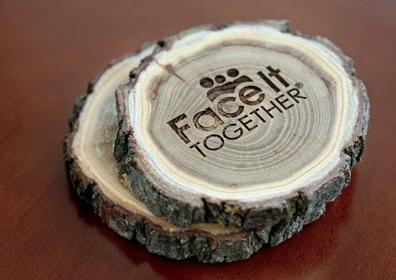
3 minute read
Sponsored
THREE TIPS FOR HEALTHCARE WORKERS STRUGGLING WITH COVID-19, COMPASSION FATIGUE AND ADDICTION
BY FACE IT TOGETHER
IT GOES WITHOUT SAYING that this last year has been a difficult time for healthcare workers, patients and the loved ones of both.
Unfortunately, as we’ve seen at Face It TOGETHER, it gets even more complicated when there’s someone in the family struggling with addiction. An addiction wellness nonprofit, Face It TOGETHER has grant funding available for those impacted by COVID-19, particularly healthcare workers.
Below are just a few recommendations for healthcare workers who are struggling with compassion fatigue and moving on from COVID-19, regardless if addiction is affecting their life or not. We’re also sharing the stories of Vicki* and Paul*, two healthcare employees who received grant-sponsored loved one coaching.
1. ROUND OUT YOUR TOOLKIT
Coping skills look different for everyone, but they’re critical when it comes to handling stress and difficult emotions. Many are simple —like deep breathing or a daily gratitude practice— but they’re incredibly beneficial. Make sure you have several to rely on when you’re faced with a challenge.
As an acute care healthcare worker for more than 20 years, Vicki has been professionally and personally challenged by the pandemic. While her husband was in the hospital with COVID-19 for two months, she didn’t miss a day of work.
“To live with it and deal with it at work —I was immersed,” she said.
Vicki is a big believer in letting go of the things outside of her control; it’s a skill she learned at Face It TOGETHER. She first reached out after discovering how serious her loved one’s addiction was.
“I can’t control how people act, but I help them as best as I can, protect myself and my boundaries and move on,” she said. “I have a nice work/home separation because of coaching.”
2. PUT YOUR NEEDS FIRST
Too often, caregivers put the needs of others before their own. We see this often in our loved one members; they take on the role of caregiver at work and at home, which leaves them exhausted. There’s nothing wrong with attending to others, but not taking time for yourself can cause resentment and put you in a worse position to help.
Early on in coaching, Vicki stressed about nearly everything going on in her loved one’s life. She learned to take a step back, remind herself what she can control and meet her needs first and foremost.
“You can’t help others if you don’t take care of yourself,” she said. “My nutrition, exercise and sleep—I’m protective of those things. I need them in order to help and listen to others, including my loved one.”
3. SEEK HELP
Whatever you’re facing, you don’t need to do it alone. Find a professional or organization that meets your needs and makes you feel safe and supported. You’ll get help developing those essential coping strategies and ease the fatigue that comes with caring for others. Whether it’s therapy, a support group or medication, get the support you need to move forward.
Paul and his wife reached out to Face It TOGETHER for help with their daughter’s alcohol addiction late last year.
“We didn’t know how to interact with our daughter; we were always walking on eggshells. We didn’t know how to live our daily lives with addiction always in the background,” he said. “We just really needed somebody to talk to.”
Paul is in a facilities leadership role in a senior living facility. Though he doesn’t regularly interact with patients, the pandemic has had a major impact on revenue and his department’s staffing capability. Learning more about addiction and how to cope with it has made other areas of Paul’s life easier.
“I don’t worry about what’s happening outside of work anymore,” he said. “Instead of wondering what’s going on and what we should do, I have some new tools now that I never had before.”
Face It TOGETHER peer coaching is evidence-based, confidential and available to anyone impacted by addiction. Free support is available for healthcare workers and others impacted by COVID-19. Learn more at wefaceittogether.org. ❖ * Pseudonym



By your side, and moving FORWARD.
We wake up every day to serve in the towns and places you call home. We’ve expanded our innovative care, expertise and access to always keep your patients moving. Because forward
is the only direction we know.
REFER TO 605-217-2667, OPTION 7. CNOS.NET


